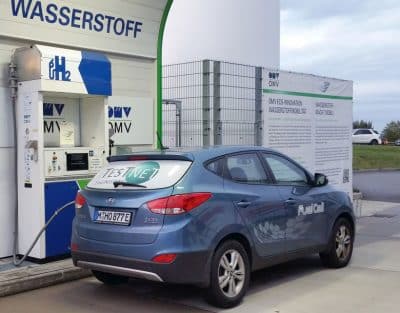Special edition vehicles produced in only small numbers: It’s what luxury car manufacturers do to cultivate an air of exclusivity and add value to their brands – and their methods seem to work. They could also be a model for German OEMs to establish new technologies promoting sustainability. At least, that’s what it looked like to employees of TesTneT when they were searching for German automakers that could provide them with a fuel cell vehicle. What they found was not even worthy of a special edition: “There are some prototypes available and many, many announcements, but not one car that any ordinary citizen could drive, let alone buy – neither flattery, nor a well-filled wallet will get you anywhere.” The following paragraphs describe their experiences over the past months.
We really wanted to add a fuel cell vehicle to our carpool, so we compared available options to figure out which items we could cross off our wish list. In the end, we decided to look for an ix35 Fuel Cell by South Korean automaker Hyundai. It was surprisingly easy to find one. We called up a popular car website and typed in “hydrogen” in the Fuel field to get in touch with a dealer that sold us a model, including a temporary license plate, for around EUR 40,000. It took only few days until the future of driving had reached our offices.
Car registration and insurance gave us no trouble at all. We can probably thank Linde and its BeeZero fleet for that. Its carsharing program had laid most of the groundwork for the use of hydrogen vehicles in Germany. After getting a few CEP fuel cards, we were ready to take the car out for a spin. Fast forward nine months and our meter shows about 24,000 kilometers, or 14,913 miles, travelled. During all this time, neither the vehicle itself, nor the refueling infrastructure posed any problems.
Of course, we had to make a few adjustments to some routes, so they match up with a refueling network that is growing but still limited. Some business trips required that we take a conventional vehicle, as the drive from one hydrogen station to the next exceeded the range of the car. That’s the price you pay for owning an FCEV, of which there are only about 300 in Germany. There are still some minor issues. For example, there is no cruise control and the small battery size will lead to an early loss of engine braking when driving downhill. But, as said, these are minor problems, which we believe will be solved in the next vehicle generations.
All in all, the car has been a positive surprise. We expected higher hurdles and greater drawbacks.
The great unknown
What has been just as much a surprise to us were the comments from colleagues, business partners and friends. While people from the hydrogen community in Germany showed excitement and genuine admiration at the sight of our latest carpool addition, many others did not know what to say or what to think of our choice. It’s remarkable how many technically minded people can’t tell you that, for example, fuel cell vehicles have electric motors and not internal combustion engines, that hydrogen is stored in a gas tank and not in liquid form inside the vehicle, that refueling takes a few minutes and not several hours, and that an FCEV is the natural partner to and not the sworn enemy of a battery vehicle.
It’s understandable how people came to these views, since we feel that the public is not being sufficiently informed. Most of them grew up in a time dominated by internal combustion engine cars and even the ones who have a very limited interest in technical details have developed a minimum understanding of how conventional engines work. But moving forward, a keen interest in the technology, or intimate knowledge of it, should no longer be a deal breaker, since the cars will need to be sold to more than a small group of engineers working in the field.
To purchase or not to purchase could then be a decision based on well-known and common criteria such as design, price, usability and brand image. The successes of the past show that automakers have been able to rise to the challenge on the conventional car market. What’s keeping them from trying the same strategy to sell FCEVs?
Some ideas
The chicken-and-egg dilemma of what to increase first, the number of filling stations or the vehicles sold, is starting to lose importance as more refueling sites are being set up. Germany had over 60 operational hydrogen stations at the end of 2017. Expectations are that the oft-heard magic number of 100 stations will be reached soon. Big cities, such as Berlin, Frankfurt, Hamburg, Munich and Stuttgart, and conurbations, such as the Ruhr area and the Rhine-Neckar region, have already seen the installation of a reasonable number of hydrogen stations for public access.
…
Written by Dr. Marius Herr, TesTneT Engineering GmbH, Munich, Germany




























0 Comments